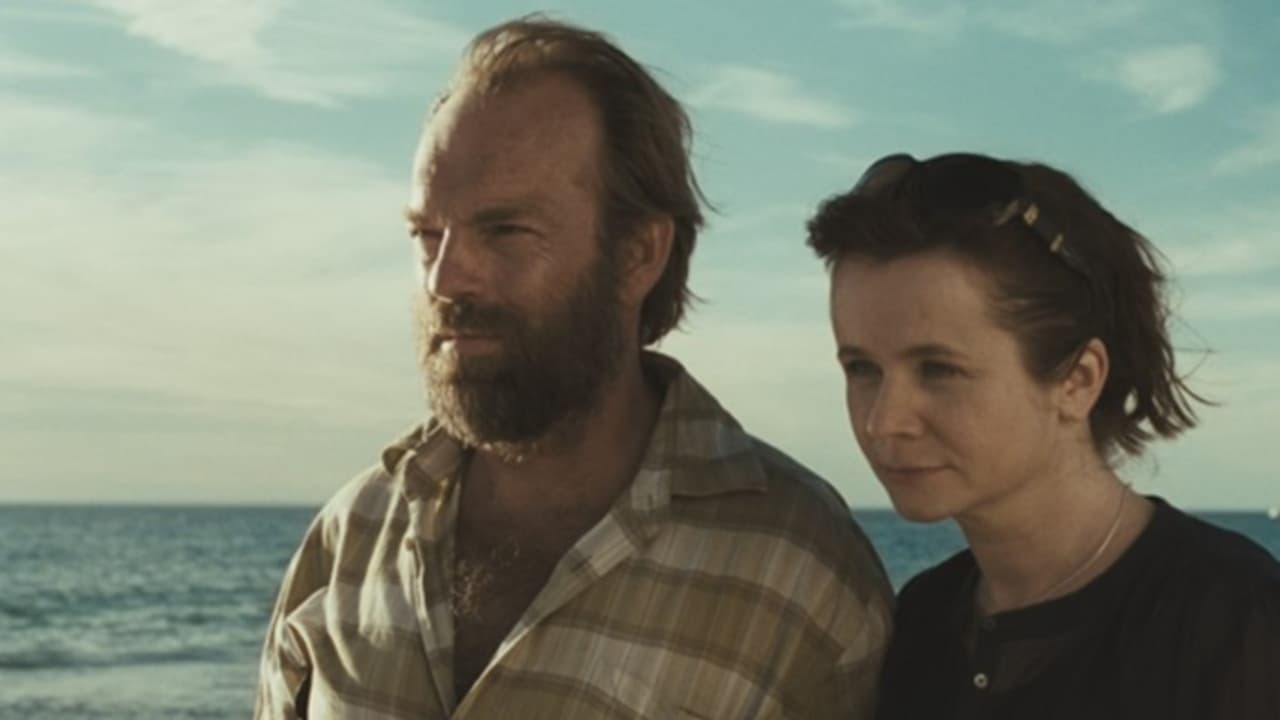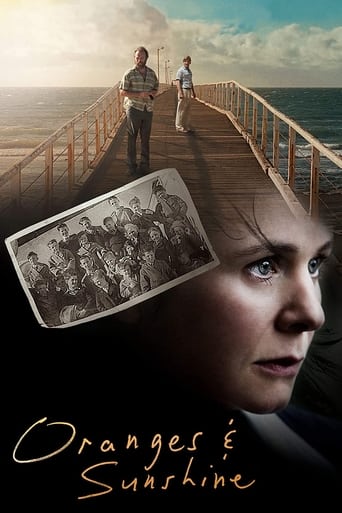

Just so...so bad
... View MoreAmateur movie with Big budget
... View MoreWhile it doesn't offer any answers, it both thrills and makes you think.
... View MoreThis is one of the best movies I’ve seen in a very long time. You have to go and see this on the big screen.
... View MoreA gripping film, which tells a story of child migrants deported from the UK to Australia. Margaret, the film's heroine reunites estranged families and brings worldwide attention to the cause.The fact that the story was based on true events from the 1980s, with graphic tales of child abuse and social injustice, leaves me with a rather raw sense of disgust. Whilst the film is brilliant, I didn't actually enjoy watching it. It is the type of film that makes you think about all the wrongs in this world. But perhaps that is what makes it so brilliant. Worth a watch, but don't say I didn't warn you.
... View MoreMaking an "historical" film is a fine balance. Much of history, even important history, can be exceedingly boring. How then, can a movie, whose sole raison d'etre is to make money via entertainment, possibly achieve this end without a substantial dollop of poetic license? And at what point does the ratio of fiction to fact destroy a film's credibility? Is it morally justifiable to get the 10% of history across by sugar coating it with 90% of saccharine? At what point should the moral responsibility of a director decide that he should make a documentary rather than a "drama"? More power to people like (the real) Margaret Humphreys, the protagonist of this film. The world surely needs more like her. But I can't help but think that a person who has done what she has done would not cringe at the portrayal of her in this film. This movie tries to tackle a number of issues related to the general topic of British children being sent overseas to a new and hopefully better life. First there is the standard and thorny topic of whether children should be taken from their mothers (fathers do not get a solitary mention here), and if so under what circumstances. Modern day viewers, in our supposedly enlightened age are supposed to settle our overfed bodies into a soft lounge suite, gaze into our 60 inch televisions and pass enraged and morally superior judgments on decisions made 70 years ago, in a zeitgeist we will never understand, when even a "wealthy" and "civilised" nation like Great Britain was for most people a hell hole of poverty, great depressions and world wars. Then there is the issue of what appears to be the mismanagement on the part of (in this case) the Australian authorities in placing these children. This issue, key to the understanding of the whole process, is scarcely mentioned. Thirdly, the specific issue of abuse suffered at the hands of Catholic priests. It is this last issue that comes in for the biggest hammering and which considerably blurs the focus of the movie. All of the horror stories we hear are from men, and most of these are related to abuse by Catholic priests. We are bound to wonder if the movie is a comment about sending children overseas or about the generic issue of the sexual persuasions of Catholic priests, anywhere or at any time. Or are we supposed to link these generic Catholic abuse issues to what (I gather) is supposed to be the primary "subject" of the movie, forced deportation of children from the UK, thereby making that issue seem worse? It is difficult to be convinced about the veracity of a movie that has an Australian woman, out of all places in England, randomly turn up at Margaret Humphrey's encounter group. Or that that person should hand over to a complete stranger all the documentation that this movie goes to great lengths to show us is so difficult to find. Or that any normal person in Britain, at a time when overseas travel was a once in a lifetime experience, could find the money to up and fly away to Australia. Or that superiors in a government agency that is so cash strapped it sends its children overseas are so benevolent that they can offer Margaret 2 years leave and funding to pursue her research. Or that everyone in the world, including a young man in the Australian Embassy and a woman in her encounter group, know about this when Margaret and her employers, who are in the business of the disposition of children, know nothing. And what is with the whole "Len Connelly behaving like a obnoxious dork" act when we meet him, but being perfectly normal in subsequent scenes, all about? And can we really believe that a person so badly abused by Catholic priests would donate considerable amounts of money to them? What was that whole visit to Bindoon, with its ridiculous and totally unbelievable "tea" scene, all about? And the nadir of Margaret flying off the handle in the totally contrived "Ave Maria" scene? The equally nauseating and unrealistic "I gave you Mummy for Christmas" scene? For Pete's sake, never give children lines that could only come from philosophers. We meet many people, but never long enough to care about any of them. We don't really connect with Len, Nicky, her brother, Charlotte, Vera, or the many other bit players that turn up. For all her angst Margaret herself is not portrayed as a particularly warm character, and we have to deal with the hypocrisy of her (apparently) being guilty of the same sins as those she rails against – not caring enough for her own children. The movie is, I think well intentioned and it is a subject we should all be aware of. For all that, I would have been far more interested in tracing a specific child's passage from a child in poverty stricken England to adulthood, with or without Margaret Humphrey's presence. This at least would have given a complete picture and provided a much needed focus.
... View MoreIt is always a jolt when a bit of buried history surfaces and makes us realize that the world is not all that sane as we would like to believe: the Chaos Factor raises its ugly head as in this screen adaptation by Rona Munro of Margaret Humphreys' true story book 'Empty Cradles'. This is a very powerful film, all the more so because of the quality of acting and direction by Jim Loach who never lets the film run out of control despite the unveiling tragedy.The story is set in the 1980s where Nottingham, social worker Margaret Humphreys (Emily Watson) is a social worker who encounters a middle aged woman who has traveled form Australia to find her birth parents. Margaret at first doesn't want to increase her workload with a wild tale of children having been deported form England by ship to be placed in orphanage work camps in Australia, but with the aid of her supportive husband Merv (Richard Dillane) she begins to investigate the uncovered secret, ultimately traveling to Australia where she meets the 'unwanted children' as adults each longing to return to the UK to meet their families. The children when deported were as young as four to thirteen years old and had been told their parents either were dead or didn't want them and the representatives from the government promised them a safe home with 'oranges and sunshine' in Australia. There are several 'victims' as played by Hugo Weaving, David Wenham, Russell Dykstra and others who help personalize the unspoken crime until Margaret progresses to the point where she can hold the British government accountable for child migration schemes and reunite the children involved -- now adults living mostly in Australia -- with their parents in Britain. Though the deportations occurred from the 1940's through the 1970's it was only after Margaret Humphrey's 1994 book and then much later after when February 2010 Great Britain's Prime Minister Gordon Brown finally issued a full apology to those deported children and their families.The supporting cast is uniformly excellent but it is the glowing performance by Emily Watson that makes this revelation of a film remain in the mind long after the credits explain how the solution played out in reality. This is a tough film but an important one and deserves a much larger audience than it has found. Grady Harp
... View MoreI signed up just to be able to review this movie. I don't think I can expressed the right words to describe how much this movie touched me, but I shall try...I love Australian movies, so when I saw the ad on TV for Oranges and Sunshine, I quickly pressed the record button, especially since there were quite a number of my favorite Australian actors in it (David Wenham, Hugo Weaving..just to name a couple)I had not heard of the Forgotten Children, as it was just before my time, but it is truly a horrifying story for any individual, especially to those who are parents (like myself). Orphaned children, between the ages of 8-15, were illegally deported to Australia from the UK, where they were neglected and abused in orphanages and children's homes. Many years later, a social worker in the UK discovers about these children,and discovers that quite a number of them weren't actually orphans, and their families had been searching for them for years. The social worker makes it her mission to reunite as many families as possible, or at least try to answer some questions of identity.You ride the roller-coaster of emotions with every case. These actors gave the best performances of their lives, in my opinion, especially Hugo Weaving. You could 100% believe that he was a man who is broken and scattered from his past-experiences and questions about himself.The most gut-wrenching, and nerve-wrecking part of the movie was when Len (David Wenham) and Margaret (Emily Watson) made a trip to Bindoon, where a church organisation known as "The Brothers" were notoriously abusive. During their visit, there is a montage of interviews with other men who suffered during their time there. I was sobbing like a baby. It is this very scene that I feel best explains why she couldn't give up on these people.This is a movie I think everyone should see. I certainly enjoyed it so much more that I thought I would (as much as you can enjoy movies of this kind, of course) It should have won many more awards than it did!
... View More